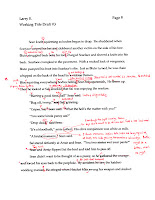I download many books on my Kindle. Some of those books are
poorly written. One author, who had a series listed with ten books, started so
many sentences with “ing” phrases or gerunds, I stopped reading the book after
three chapters, and the plot had great potential, but I just couldn’t bear
reading it. I hope that his writing improved, but I will never know because the
first of the series that I downloaded gave me no incentive to download another.
Immediately after finishing my rough draft, I started
reading and revising. I couldn’t help myself, so I stopped reading. I’ve waited
to put some distance between myself and my creation. The distance is necessary
so that I’m not baffled by the forest for the trees. When I read it the first
time, I should be looking at the major plot points, ensuring that the mystery
itself comes together, that the clues are there for the reader, that the
characters’ motivations match their actions and that the plot is without
artifice.
After I read for those major points, only then can I
wordsmith. It must be done in that order so as not to waste my own time. If
rewrites are necessary (as I’m sure they will be) then why tweak what may disappear.
It would be like taking the time to decorate a cake only to discover that a new
cake must be baked.

Does each story have an ideal composition? How do authors
discover that ideal?



There might be an ideal way for each particular author to write a specific story. How to get there? Work it until it is as perfect as you can make it at this point in your writing career. Later on when you see what was finished you'll see how it could have been better. Perfection is a moving target. That means the more you write, the better you get.
ReplyDeleteHow many concepts do you mentally try out before you put a word on the page, Warren?
ReplyDeleteEvery time is different. I try to throw something on the page, whatever I have, and work from there. For a longer work I have a list of characters and a time line in a notebook to refer to while I write on the computer. When I use a formal outline, it doesn't work well. I wish it did. I'd spend less time being totally lost.
ReplyDeleteI actually like the editing part. In fact, I've edited my first book so many times it's become not exactly a different book, but a better book. My critique partners, both local and Guppy have been very valuable. I think once you get started, E.B. you'll actually find little nuggets that you'll say, "Wow! Did I write that? It's good." :-)
ReplyDeleteI understand how we are a bit intimidated when we read authors we greatly admire. I like Jacquiline Winspeare, too, but another writer I'm totally in awe of is Louise Penny. Our own Linda Rodgriguez is an author to intimidate, too.
All true, Gloria. I find it intimidating, mainly because I've done this before and never feel as though anything is good enough. I got hits from agents wanting to look at my last ms, but no takers--it makes you feel as though you must be writing drek.
ReplyDeleteHey, EB,
ReplyDeleteHits from agents are signs you're doing many things well. Asking for a partial or full manuscript is additional proof. LIke job interviews, it only takes one.
Thanks for reminding me that the glass is half full, Warren. I will endeavor to preserver. (as said in "The Outlaw Josey Wales")
ReplyDeleteI wrote my novel by developing the characters and their back stories first then lead into the heart of the story. I've had comment that it takes some readers too many pages to get into the storyline. Should I give in to everything has to bite you in the first ten pages or keep the a straight time line?
ReplyDeleteIdeas, Warren???
Editor Ramona Long says to keep backstory to the minimum and work backstory in a little bit at a time, and she's right. If you aren't published on the novel market as yet, it's much better to get the action started as soon as possible. I know you asked Warren, but I knew the answer to that one. Ramona used to be a blogger here at WWK. Click on her name under the labels. I think you can still access her blog about that topic.
ReplyDelete